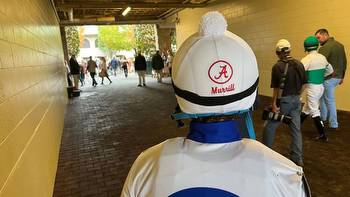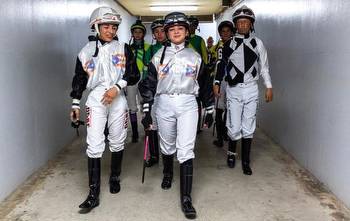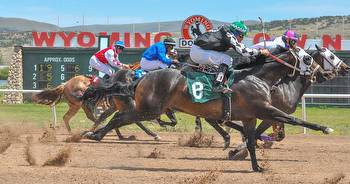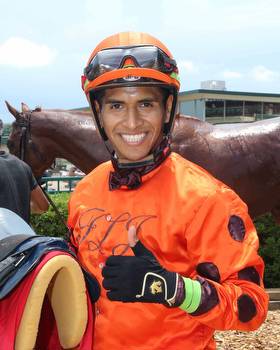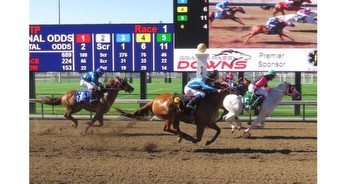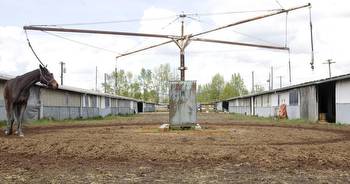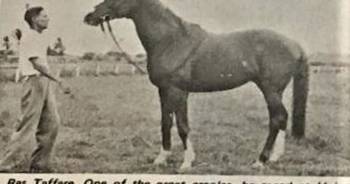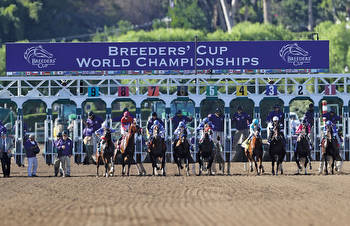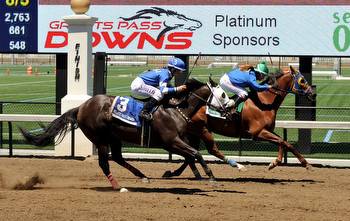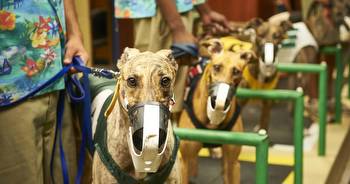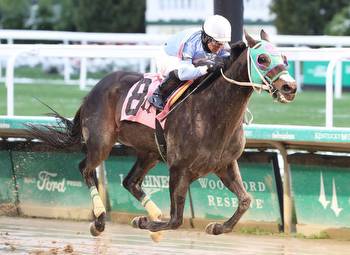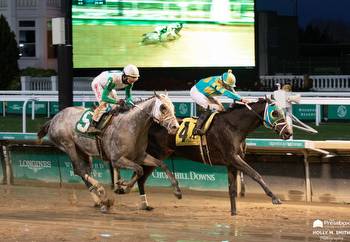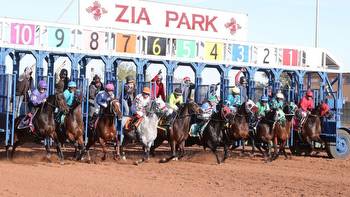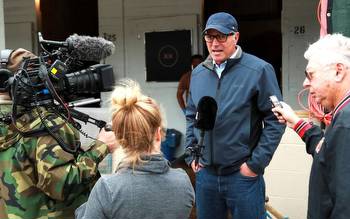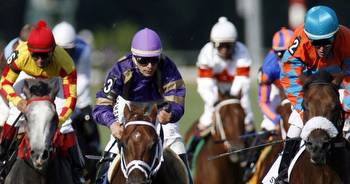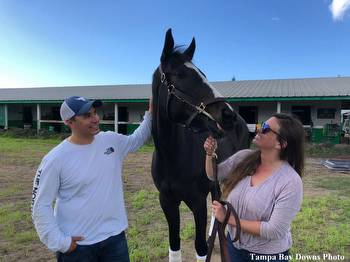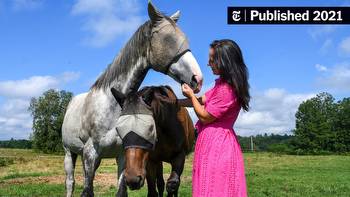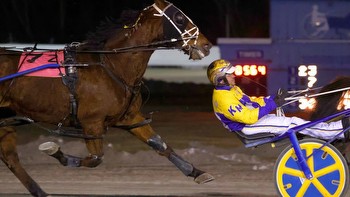No Need for Speed at Grants Pass Downs in Oregon

GRANTS PASS, Ore. — The safety rail came from the Los Angeles County fairgrounds. The camera towers from another long-gone racetrack in the Golden State. The horse ambulance? Bought in Kentucky.
Everything about Grants Pass Downs has been reclaimed with the exception of one thing: its mission to be the safest and most community-focused racetrack in the nation.
For 15 weeks a year, this corner of the Josephine County fairgrounds is the hub of horse racing in Oregon, a circuit short on money but overflowing with camaraderie and compassion, which have often been missing at the sport’s richer and more glamorous racetracks. The men and women here are united by their bonds with the horses and their commitment to the animals’ well-being.
The makeover of Grants Pass Downs from a dusty fair meeting into a Brigadoon for horse racing in the Klamath Mountains was Travis Boersma’s idea. He grew up on a local dairy farm and became a Grants Pass Downs railbird long before he and his late brother, Dane, turned a pushcart coffee stand in town into Dutch Bros. Coffee, a chain with more than 450 drive-throughs mostly in Western states. He is also a high school soccer coach, which explains the soccer fields laid out in the track infield for children of the Rogue Valley.
The bros loved horses and their hometown, and wanted to enrich both. Boersma’s racetrack was built from spare parts, but his vision for it is holistic.
“It’s a great sport that we have,” Boersma said. “I think there’s a way to do it in a classy way, and I have a really simple plan — show some T.L.C. to the horses and the people who care for them. When people love on each other, good things happen.”
It’s the kind of good-vibes-only proclamation that people here expect from Boersma, whose uniform of backward ball cap and flip-flops and his side hustle as the soccer coach for the Grants Pass High School Cavemen belie his business acumen. Dutch Bros. is exploring an initial public offering with a valuation of $3 billion to $5 billion.
In the meantime, Boersma has provided a quirky destination for an eclectic collection of D.I.Y. horsemen — and women, as they dominate the top of the leaderboards.
“We can’t imagine a life without horses in it,” said Jaqueline Smith, pacing her shedrow to say good morning to her horses.
Smith greets her horses much the way she did the kindergarten students she taught for 30 years in Kennewick, Wash.: eye to eye and in soft, soothing tones.
“How’s my classy girl?” Smith asks Jaded Tiger, leaning her head against the nose of the 3-year-old filly.
“You’re the love of my life,” she whispers in the ear of Megatron Ruler, who, at age 10, will be retired in the fall to become an equestrian.
Smith followed her father, a part-time horse trainer, to the racetracks of the Pacific Northwest, where he passed on an old-school ethos rarely seen on the bigger circuits. She owns her horses. She drives them herself from track to track.
“The only thing I don’t do is ride them,” she said.
Home in the summer and fall is a trailer parked in a court next to the track. Veterinarian bills are mostly nonexistent. Smith does not give her horses anti-inflammatories or inject their joints. She gallops them only a couple of days a week, preferring to walk them most days.
In November, she returns to her farm in Washington and sets her stable of horses to pasture for five months. “I let them be horses,” she said.
Her regimen makes for healthy horses. Over four decades, she has trained hundreds of horses in more than 1,400 races without one fatal injury. The purses here and at fair tracks in Tillamook and Crooked River rarely reach $10,000, not enough to risk the health of your horse when keeping it running into old age may be what sends a son or daughter to college.
Smith’s careful approach to horse management has accounted for nearly 300 victories and more than $1 million in purse earnings. Last year, she retired a horse named Cantchaco, whose 44 victories in 95 starts put him among the most successful horses in North America and conjures war horses of yesteryear like Seabiscuit. Cantchaco has a new career in show jumping.
“My feeling is if you develop a personal bond with each horse, keep them healthy and nurture their talent, they will reward you,” Smith said. “I’ve not only made more money with my horses than I did teaching, they’ve rewarded me with a passion and lifestyle that I cannot imagine living without.”
There are men to be found, but it’s the women who give the place its character and warmth. Mary Boyle, 75, is a former gymnastics coach and high school administrator who grew up with horses but did not reconnect with them until after retiring. She bought a few mares to breed, which led to weekends racing them in fair meets in Prineville and Union.
Now, Boyle keeps a string of eight horses and is an ebullient presence leaning over the rail in the morning or popping from group to group on the racetrack during evening racing hours, her laugh as festive as her trademark red-and-yellow blouses. Her Glory B Stables wins at an impressive 22 percent clip despite the fact that she cannot turn her back on her slow horses until she finds them a good home.
“I do this instead of a going to the gym,” Boyle said. “I’m outside all day and active, and it gives me a built-in family and social life.”
The jockeys’ room here is a cross of a sorority house, a sweaty gym and an equine finishing school. In the mornings, the track’s leading jockey, Joree Scriver, all smiles and ponytail, pedals a banana bike from barn to barn.
McKenzie King, 24, wipes sleep from her eyes after driving late into the night after riding the previous day in Pleasanton, Calif., more than six hours away. She’s multitasking, taking care of 19 horses that belong to her boyfriend, Quinn Howey, while he is in San Francisco checking on his stable at Golden Gate Fields.
King is the most traveled of the female riders here. She has ridden in Colorado and Arizona as well as California.
“I have definitely improved and grown,” King said. “At other tracks, I was the only girl in the jock room, and trainers would tell me there was no way they’d ride me.”
She is not ready to quit, but acknowledges the next couple of years will help her decide whether to remain a race rider or continue to gallop horses in the morning as she moves into training them. Her friend Taylor Smith, another top rider here, is graduating from Western Governors University in Salt Lake City with a degree in elementary education and plans to ride part time.
Scriver, however, has a dream.
“I want to go to Kentucky and ride,” she said. “I want to ride at Churchill Downs — even a small race.”
Scriver has been atop a horse since learning to walk — as a little girl in 4H in Curlew, Wash., and barrel racing at rodeos as an adolescent. When she was 13, she asked a friend of her father’s, who owned thoroughbreds, to teach her to gallop.
“I wanted to go fast,” she said.
By 16, she was galloping horses for $12 a ride in the mornings and playing high school volleyball and softball in the afternoons. She got her jockey license at 18, winning for the first time in her 11th start aboard Bobbygenesjustice on Aug. 10, 2019, at the Tillamook County Fair.
She has had about 500 starts since then, has won 77 of them and finished in the money in nearly half to earn more than $590,000 in purse money. She won the riding title here in the fall and held her own over the winter against more experienced competition at Turf Paradise in Arizona.
Scriver keeps up a steady diet of galloping horses in the morning. She has to — those $12 spins add up. But trainers at bigger tracks such as Emerald Downs near Seattle have noticed her, and she is starting to get two, three, up to six mounts a day there.
“All the girls here can ride, but Joree has the drive to match her talent,” said Smith, who gives Scriver first call on her horses. “She can go as far as she wants.”
Grants Pass Downs has long been Boersma’s refuge from the world. He followed his father here as a boy, prowling the grandstand for winning tickets mistakenly thrown away, then using the proceeds to pick winners.
“I’d check the results in the paper and, lo and behold, I always had a few bucks to take to the track the next time,” he said.
When Boersma took over the commercial license for the track, horse racing was under siege after 30 horses at Santa Anita Park had to be euthanized over a six-month period in 2019. So he brought in Steve Woods, a world-class track superintendent, to put in a deep, velvety cushion of dirt that looks like mousse and sounds like heads hitting a pillow when the horses roll into the stretch.
Along with the addition of prerace veterinary exams of all competing horses and a widening of the racetrack, this little half-mile bull ring has an injury rate below the national average, said the president of Grants Pass Downs, Randy Evers.
“We wanted it kind and slow,” Evers said. “We aren’t trying to break any speed records here.”
Now, Boersma wants to expand. He spent $8 million transforming the overgrown infield that was the home of Demolition Derby races into a soccer complex.
He moved races from the weekend to Monday and Tuesday evenings so as not to compete against bigger circuits. Now the track is featured on the horse racing network TVG. In addition to a raised national profile, the amount of money bet on races at Grants Pass Downs has increased from $60,000 daily to $407,000.
By January, he hopes his Flying Lark will be open. It is a 35,000-square-foot entertainment complex with a restaurant, sports bar and about 250 Historical Racing machines, electronic games with the outcome based on previously run races. The goal is to double the $66,000 in daily purses within three years and to attract more horses and horsemen.
In all, Boersma says he has north of $35 million invested in his hometown racetrack.
“I’m over my skis a bit,” he conceded. “But this is my home, and Grants Pass Downs has always been important to our community and horse racing in Oregon.”
As the sun dips behind the Klamath Mountains a rouge halo bathes this racetrack in the valley. A new video board twinkles like a Christmas tree, shuffling through odds changes on one side while the scene in the paddock beams to the families lined along the apron.
Nearby, Bryson Butterfly, 16 and just starting his career as a jockey, signs autographs for children who look barely younger.
Scriver’s usual smile melted into a mask of determination as she guided Smith’s Jaded Tiger onto the track for the featured race of the evening, a five-and-half-furlong sprint with a purse of about $8,000, rich for Grants Pass Downs.
When the gates burst open, Scriver sat upright on Jaded Tiger with the appearance of someone in no real hurry. Heading into the far turn, however, she crouched low and rubbed her hands on the filly’s neck, and Jaded Tiger shot around four horses and won by nearly two lengths.
Scriver’s smile returned as she galloped Jaded Tiger to the winner’s circle to reunite with Smith. After the win photo was snapped, Grants Pass Downs’s leading rider slipped off her saddle and leaned into the track’s leading owner to celebrate.
She beamed all the way back to the jockeys’ room.
“I love this sport,” she said to no one in particular.

